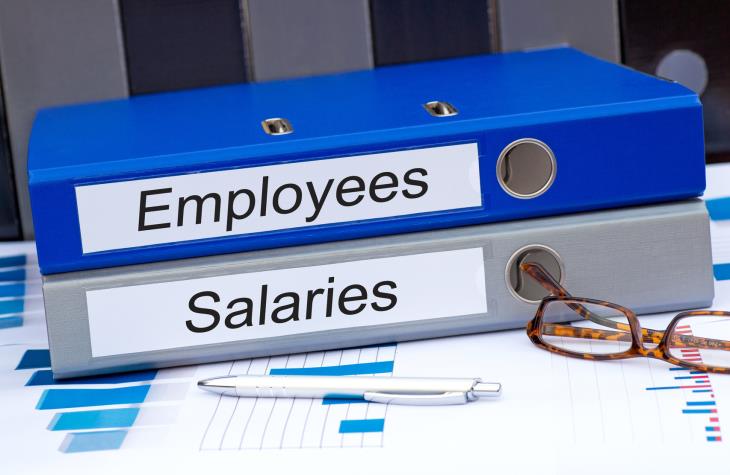 I have been asked several times recently how much to pay someone both in terms of a new employee and as a pay rise. There are really 3 things to consider when you are deciding what to pay:
I have been asked several times recently how much to pay someone both in terms of a new employee and as a pay rise. There are really 3 things to consider when you are deciding what to pay:
1. What is the going rate of the pay for the type of position in your area?
2. What additional costs will there be?
3. What can your business afford?
You can find out what the going rate is for the position you want to fill by looking at recruitment websites. Rates will vary according to experience and to the area where the job is based so you will soon get an idea of what the range of pay is for the area you are in. Knowing the rate will ensure you will not be paying too much or too little. If you pay too high a rate you may recruit someone who expects the job to have more responsibility or progression than it actually has. If the rate of pay is too high and you find the employee is not capable of what you expect you will resent paying them that rate, especially if the cost is draining your business. I feel it is better to start at a lower rate and reward with a rise when appropriate. However if you pay too little you will have less response to your advert and probably not get the ideal applicant you are looking for. Equally if you recruit at a lower pay rate and don’t reward with increased pay when earned your new employee will soon be looking for a better paid job where they will feel appreciated.
Deciding on a salary or an hourly rate is not the only cost you need to think about. You will need to add on the costs of employer’s NI at 13.8% if they are to be paid more than £680 per month and employer’s pension contribution at 2% (from April 2018) if they join your pension scheme. These are costs which have to be taken into account when working out what it will cost you to employ someone. Always recruit based on a gross salary or gross hourly rate (before deductions). Never agree to pay a net salary as you will not know the true cost of employing that person until they have already started working for you. A net salary means you have to provide a gross salary to cover all their deductions – tax, NI and pension contribution – as well as your own contributions and this will be very costly.
There are other costs which are incurred when you employ someone which may not occur to you until after they have started work. There are obvious ones like providing them with a desk, a chair, a computer and training but other “hidden” costs will be more stationery, more refreshments, an annual social event, gift for birthday and/or Christmas, maybe travel expenses if they go out on business, uniform or mobile phone. The additional costs will depend on the type of business you have but it is generally not just a simple salary calculation.
 The final point is perhaps the most important. Knowing what your business can afford to pay is vital. Whatever salary you think you have to pay, having done your research, and once you have worked out the additional costs of paying that salary, you have to look at whether your business can support that salary. There is no point paying someone the salary you think you have to pay only to find that it is draining your business of cash. What you pay has to be sustainable in the long term because the employee is reliant on receiving that salary and you can’t change it once offered. Some employees may initially be a drain on the business while they learn the ropes but you can see that in time the business will reap the benefits. Others may never get to the point where they add value without draining the resources. Maybe the employee you want is earning a lot more in their current job than you were planning to pay but that doesn’t mean you have to match what they were earning if it will be detrimental to your business. Money is not the only reason people change jobs.
The final point is perhaps the most important. Knowing what your business can afford to pay is vital. Whatever salary you think you have to pay, having done your research, and once you have worked out the additional costs of paying that salary, you have to look at whether your business can support that salary. There is no point paying someone the salary you think you have to pay only to find that it is draining your business of cash. What you pay has to be sustainable in the long term because the employee is reliant on receiving that salary and you can’t change it once offered. Some employees may initially be a drain on the business while they learn the ropes but you can see that in time the business will reap the benefits. Others may never get to the point where they add value without draining the resources. Maybe the employee you want is earning a lot more in their current job than you were planning to pay but that doesn’t mean you have to match what they were earning if it will be detrimental to your business. Money is not the only reason people change jobs.
Every employer must pay the minimum wage, must pay employers NI and employer pension contributions when the thresholds are reached but the costs to the business can be minimised. You can save costs by employing someone part-time rather than full-time. You can save on employers NI by using the £3,000 employment allowance which is available to employers each year. Pension contributions may not be able to be avoided because an employee can choose to join your pension scheme even if they are below the earnings threshold. And once you have an employee that really adds value to your business you could increase their hours and their pay knowing that the business can support it.
Understanding what your business needs from a new employee and what the business can afford will ensure you don’t end up in a difficult financial or employment situation.
Leave a Reply